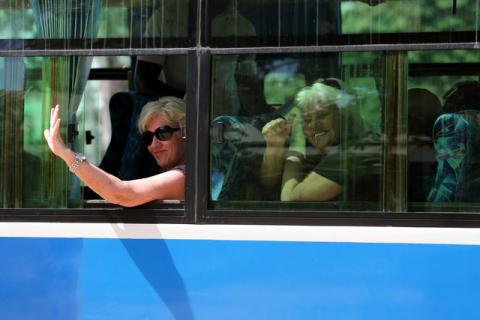Advertisement
Gambians, tourists flee on eve of deadline for leader to surrender power
BANJUL (Reuters) - Gambians and tourists were boarding buses, packing suitcases onto trucks and hiring canoes to flee the capital on Wednesday, as President Yahya Jammeh clung to power on the eve of his rival Adama Barrow's planned swearing in.
Jammeh, a former soldier who once vowed to rule for "a billion years", is refusing to step down, despite condemnation from regional leaders and even the threat of an imminent invasion by West African troops to enforce his election defeat.
Residents in two Senegalese border towns reported heavy troop movements towards the frontier and a Senegalese military source confirmed the build up.
In a sign he is digging in, Gambia's National Assembly has passed a resolution to allow Jammeh, who has been in power since a 1994 coup, to stay in office for three months from Wednesday.
The president's allies have deserted in their droves -- at least eight ministers have so far resigned of whom four quit in the past 48 hours -- and it is unclear how many of his own armed forces will be willing to defend him once his mandate expires.
But many Gambians are not waiting to find out.
At the sandy Bundung Garage bus station in the capital, Banjul, women carrying infants strapped to their backs queued up to get the belongings they had salvaged onto buses bound for the southern border with Senegal.
Men and children sat patiently amid piles of suitcases, rolled up foam mattresses, bags of rice, bottles of cooking oil.
"The last three days we've been submerged," said bus park manager Sonore Momodou Choi, his face shaded from the blazing sun by a fishing hat.
"Normally we load three minibuses per day. This week we're 25 a day, not including the bigger buses."
Jammeh declared a state of emergency on Tuesday, but a Banjul-based diplomat said it wasn't clear what extra powers this would give his forces or if the president even had the authority to enforce it.
Others fled on pirogues across the river that splits Africa's smallest country down the middle.
REFUGEES ARRIVE IN SENEGAL
In a Supreme Court petition, Jammeh said the electoral commission was subjected to "foreign influence" and biased against him.
But the court lacks the judges to rule on the challenge, a situation that would have suited Jammeh well had he won, as he expected to, but which now renders it difficult for him to challenge the poll legally.
In Zinguinchor, in Senegal's Casamance region south of Gambia, a Reuters witness saw 12 children crammed in the back of a van on a beach less a few hundred metres from the Gambian border next to a heap of belongings in plastic bags.
"We were scared by what we saw on the news," explained 14 year old Moussa Camara from Kafotang in Gambia. He crossed over in a pirogue with 27 other family members on Tuesday.
At least 26,000 people have fled Gambia to Senegal fearing unrest, the U.N. refugee agency (UNHCR) said on Wednesday, citing Senegalese government figures.
After the British foreign office raised its level of alert to advise against all but essential travel, UK tour operator Thomas Cook started evacuating nearly 1,000 holidaymakers by air on Wednesday. Tourists from other countries followed suit.
"I'd be happy to stay, but the tour operators are saying we all have to leave," said Dutch tourist Art Johnson in Banjul, where the sleepy streets are shaded by palm and mango trees.
The streets around the popular Senegambia resort strip, normally packed with tourists, were mostly empty apart from a few holidaymakers withdrawing money from ATM machines.
"It's a disaster, all my tourists are leaving," said nature tour guide Abou, who optimistically had a pair of binoculars hanging from his neck in the hope of getting a final tour in before everything shuts down.
"But we aren't afraid. Ecowas is coming," he said, referring to the regional bloc that has threatened military action to force Jammeh out if he refuses to go willingly.
The Reuters witness at Senegal's border with Gambia saw a large military convoy with fuel trucks and empty vans for moving soldiers enter barracks late on Tuesday. Several residents said this was unusual. At checkpoints between Ziguinchor and the border to the north, some Senegalese soldiers wore bulletproof vests with grenades in the pockets.
(Additional reporting by Emma Farge in Zinguinchor, Senegal; Editing by Matthew Mpoke Bigg and Richard Lough)



















Add new comment